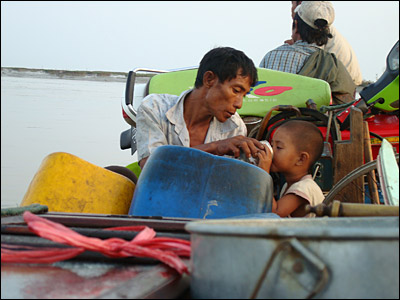More than half - 1.4 million - require prioritised assistance, says the UN Office for the Coordination of Humanitarian Affairs (OCHA).
Of the 750,000 people targeted by the World Food Programme (WFP) for immediate food assistance, as of 20 May, just 255,000 had been reached.
“We’re only reaching a third of the people in need,” Marcus Prior, a spokesman for the UN food agency confirmed, appealing for greater access for its emergency staff.
“We have an enormous job ahead of us,” Prior said.
The cyclone, which killed more than 80,000 people and left more than 50,000 missing, devastated large parts of Yangon, Ayeyarwady, Bago, Mon and Kayin divisions, home to nearly half the 53 million inhabitants and the country’s largest city and former capital, Yangon, on 2 and 3 May.
Forty townships in Yangon Division and seven in Ayeyarwady Division remain on the government’s list of disaster areas.
|
Reuters video short on the scramble |
“Humanitarian access remains inconsistent and really needs to be scaled up,” Amanda Pitt, a spokeswoman for OCHA, told IRIN on 20 May in Bangkok.
Her comments come a day after the Association of Southeast Asian Nations (ASEAN) announced an agreement with Myanmar’s military-led government to accept international aid agencies and medical workers from ASEAN countries to help with the relief effort.
The 10-member association also called upon Myanmar’s generals to allow more international relief workers into stricken areas while confirming that ASEAN would establish a mechanism to facilitate global assistance into the country.
Rights watchdog warning
While the initiative may prove a step forward, Human Rights Watch (HRW) warned that it did not have the capacity to address all the urgent needs faced by Burma’s cyclone survivors.
“Governments and aid agencies should not delude themselves into thinking otherwise,” Brad Adams, HRW’s Asia director, said.
HRW is calling on the Burmese government to open cyclone-affected areas to a major international relief effort by immediately granting visas to aid workers, to allow UN and international humanitarian agencies to distribute the aid they provide directly to those in need, and to allow countries with military assets nearby to deliver aid by air and sea to survivors who cannot be reached quickly any other way.
“Many affected communities are only accessible by air and sea, which makes assistance by countries that are equipped to deal with humanitarian disasters essential,” the watchdog said on 20 May.
ds/bj/mw
This article was produced by IRIN News while it was part of the United Nations Office for the Coordination of Humanitarian Affairs. Please send queries on copyright or liability to the UN. For more information: https://shop.un.org/rights-permissions





